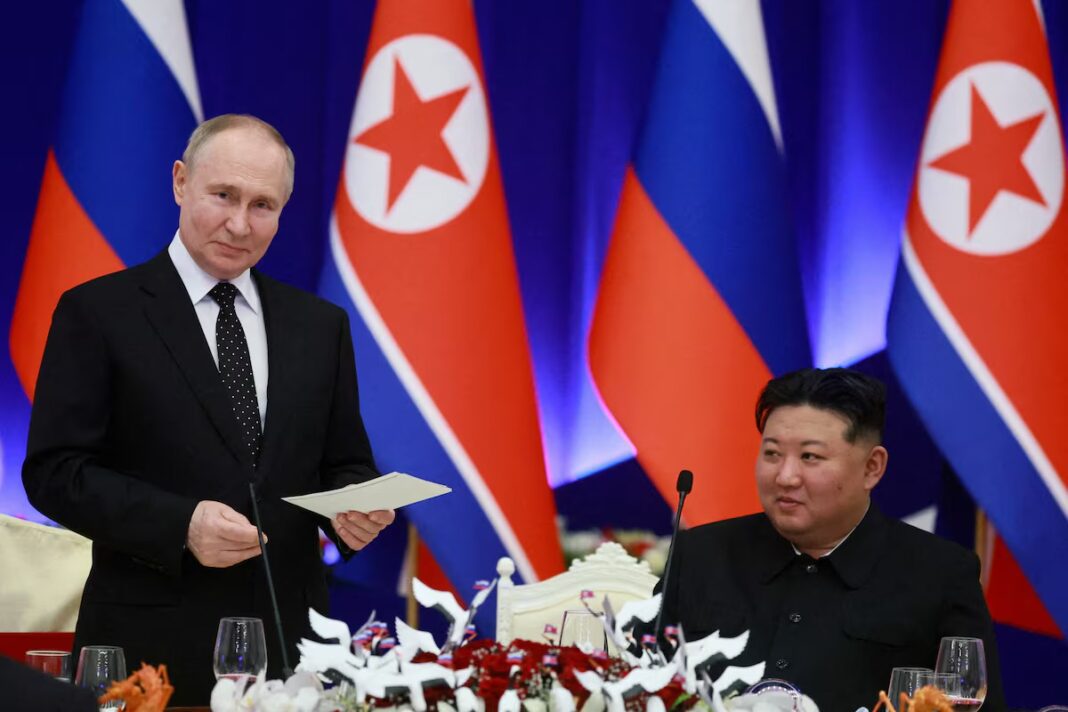Overview of the Defense Pact
North Korea and Russia have officially solidified a military agreement, which aims to provide mutual support in case of an armed attack. The agreement, initially formed between the two countries’ leaders, North Korean leader Kim Jong Un and Russian President Vladimir Putin, in June, has now been ratified by both governments. This means the two nations are now bound by a pact requiring each side to come to the other’s defense if either finds itself in a conflict.
Under the terms of this pact, both Russia and North Korea are committed to using “all available means” to provide military and other forms of assistance to one another during wartime. This move marks a significant shift in North Korea’s international alliances and has drawn widespread global attention and criticism due to the close military cooperation between the two countries.
North Korea’s Role in Russia’s Conflict with Ukraine
As part of their partnership, North Korea has provided substantial military support to Russia’s ongoing efforts in Ukraine. Reports indicate that North Korea has sent tens of thousands of troops to assist Russian forces in the region, intensifying the conflict in Ukraine. This level of direct involvement by North Korea represents an increase in the alliance’s depth, showing that North Korea is willing to offer considerable support in Russia’s international military pursuits.
This mutual defense pact with Russia may further encourage North Korea to support its new ally’s activities. For Russia, the added manpower from North Korean troops is likely to assist its goals, while North Korea gains further military backing, allowing it to strengthen its own security framework.
Details of the Ratification Process
On Monday, North Korean leader Kim Jong Un signed the necessary documents to ratify the defense pact, marking the agreement as official. Russian President Vladimir Putin has also signed the treaty into law. According to North Korean state media, the agreement officially takes effect after both nations exchange ratification instruments, which are formal documents verifying the countries’ commitments.
Both leaders have voiced that this agreement serves to enhance their countries’ relationship, bringing them closer to an official military alliance. They have promoted the pact as a strategic step towards maintaining security and countering perceived threats, primarily from Western nations.
International Reaction and Concerns
The mutual defense treaty between North Korea and Russia has not gone unnoticed on the global stage. Many countries have raised concerns about the increasing military collaboration between these two nations. Western powers, in particular, view this growing alliance as a potential threat, especially since both countries have tense relations with several other world powers, including the United States, South Korea, and members of the European Union.
There are fears that this military partnership may lead to more aggressive actions by both Russia and North Korea in their respective regions. The United States and its allies have been closely monitoring these developments, as they could potentially destabilize peace efforts in Eastern Europe and Northeast Asia.
What This Pact Means for Global Security
The new defense pact could significantly alter the balance of global alliances and raise new security concerns for countries in close proximity to Russia and North Korea. As two nations known for their military focus and political isolation, North Korea and Russia’s formalized alliance may add tension to existing conflicts and further complicate diplomatic efforts around the world.
Experts believe this alliance could lead to more coordinated efforts between Russia and North Korea in areas like weapons development, military technology exchange, and potential joint military exercises. For neighboring countries, including South Korea and Japan, this military alliance could be seen as a new, looming threat. Additionally, the growing cooperation could inspire other isolated or embattled nations to form similar partnerships, adding complexity to international diplomacy.
Broader Implications for U.S.-Russia and U.S.-North Korea Relations
The treaty will likely have consequences for the strained relationships between the United States and both Russia and North Korea. The United States has previously imposed sanctions on both countries, and this mutual defense pact may push U.S. policy toward even stricter actions. The U.S. and its allies may feel compelled to respond with additional diplomatic or economic measures to counterbalance the impact of this alliance.
While direct confrontation remains unlikely, this new development is a signal that global powers may need to rethink their approaches to international security and alliances. Both Russia and North Korea are nuclear-armed states, so any formal partnership between the two introduces a potential new risk for conflicts escalating beyond conventional warfare.
Future Steps for North Korea and Russia
Moving forward, Russia and North Korea will likely continue to deepen their alliance by engaging in joint projects that align with the terms of this treaty. Military exercises, arms trade, and even shared technology development could be on the horizon. The treaty has opened the door for both nations to support each other openly in military and defense capacities.
With both nations now linked by this formal commitment, their actions may reflect an effort to showcase the strength of their alliance. In the months and years to come, the extent of their cooperation will likely increase as they seek to leverage their partnership to meet their individual and shared objectives.
A Potential Shift in Global Power Dynamics
The new mutual defense pact between North Korea and Russia is a clear sign of shifting power dynamics in the international arena. By joining forces, they stand as a more formidable presence, potentially challenging the current global order. As both countries face opposition from the West, they are likely to continue this trend of closer ties to counterbalance perceived threats.
The development of this alliance marks a significant step for both countries, potentially impacting their relations with other nations. The world will closely watch this defense pact as it unfolds. This new military alliance may reshape global security and diplomacy. It could provide insight into shifting international alliances and tensions.

